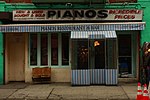Cake Shop NYC

Cake Shop was a New York City music venue, bar, and cafe in the Lower East Side of Manhattan that opened in 2005. Located at 152 Ludlow Street between Stanton Street and Rivington Street, Cake Shop offered a full bar and records for sale, but it was best known as a rock club, hosting new and upcoming bands, as well as established acts almost nightly in its basement. Considered a crucial stop on the national tour circuit, Cake Shop was regarded as one of the few venues left in Manhattan open to hosting "independent underground pop music" produced by bands considered too limited in appeal to perform elsewhere. Co-owner Nick Bodor referred to Cake Shop's booking policy as follows: “We are not going to book something unless we believe it’s at least interesting.” Established groups like Vampire Weekend, The Dirty Projectors, and The Pains of Being Pure at Heart have credited Cake Shop with helping them kickstart their respective music careers.Due to rising costs associated with the neighborhood's gentrification and issues of sustainability related to the venue's "long running" business model, the owners decided to close at the end of 2016. Cakeshop's final week was marked by nightly shows and special events. December 31, 2016 was Cakeshop's final night in operation.
Excerpt from the Wikipedia article Cake Shop NYC (License: CC BY-SA 3.0, Authors, Images).Cake Shop NYC
Ludlow Street, New York Manhattan
Geographical coordinates (GPS) Address Nearby Places Show on map
Geographical coordinates (GPS)
| Latitude | Longitude |
|---|---|
| N 40.720833333333 ° | E -73.988055555556 ° |
Address
Ludlow Street 151
10002 New York, Manhattan
New York, United States
Open on Google Maps







